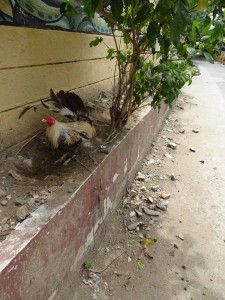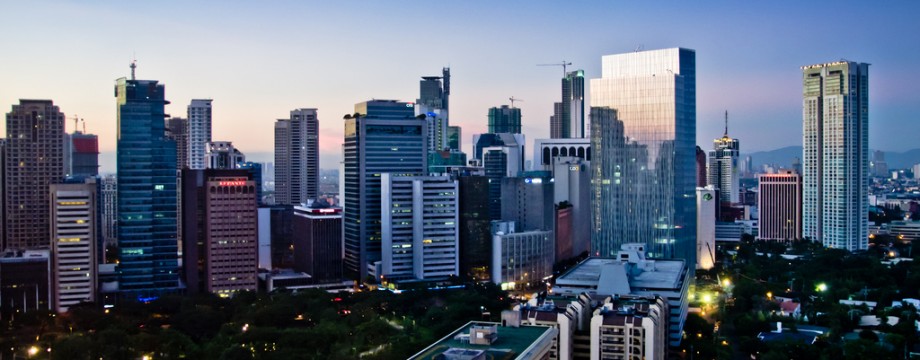I just keep a running list of these in my notebook to jot things down as I learn them or experience them. Every day I learn more interesting things about Pinoy culture.
– Speaking loudly/raising your voice isn’t done here. I don’t mean angry shouting, I mean the “I need to tell the jeepney driver where I want to be dropped off so he knows how much to charge me – over the sound of traffic” or “I’m a Starbucks employee who needs to alert the person whose name is on this cup that their order is ready – over the sound of aerating milk and coffeehouse chatter” situations. People really don’t adjust the volume of their normal speaking voices to accommodate to the situation. The only people I’ve heard raising their voice are pedicab drivers trying to gather customers, vendors advertising their wares, or “barkers.”
– “Barkers” are the ones who wade into traffic for you to flag down a taxi. Sometimes they’ll do this without you asking and despite you not wanting them to, because then it’s customary to tip them and if they see you trying to flag down a taxi they’ll do it more assertively and then ask for money. Additionally, sometimes vans will pay barkers to find them passengers. These vans function as multi-customer, multi-destination taxi services, so they like to fill up before charting a route to hit all the destinations.
– Jeepneys function as “hop on, hop off” transportation, so naturally the back is left open for passengers to come and go quickly. This means, however, that when jeepneys are stopped dead in a traffic jam, beggars will sometimes jump on to “shine shoes” or ask for money from their captive audience – always hopping off again before the vehicle starts moving.
–  Cornerside roosters. You see them everywhere, either under wire cages or with a tether around their leg to keep them from straying. I asked if they were being kept as pets or food, but the answer was neither: they’re for cockfighting. Not only is this a popular sport here in the Philippines, it’s perfectly legal as well.
Cornerside roosters. You see them everywhere, either under wire cages or with a tether around their leg to keep them from straying. I asked if they were being kept as pets or food, but the answer was neither: they’re for cockfighting. Not only is this a popular sport here in the Philippines, it’s perfectly legal as well.
– Beware of the Higad: It’s a good thing that we were with a local when we first encountered these little caterpillars. They look like the harmless worms that turn into butterflies that Kelsey and I are familiar with, but these ones are poisonous and skin contact with them would lead to a painful stinging rash. Unfortunately, they’re apt to fall from the trees on St. Scho’s campus, so certain sections under the trees are roped off. Doesn’t mean they don’t migrate once on the ground, though, so you have to keep a lookout for these guys. No incidents yet, and with two weeks to go before we leave, I hope we can keep it that way.
– Fun fact: despite the Catholic character of this nation, Islam actually predates Catholicism in the Philippines by ~300 years.
– A noon prayer is played every day. And not just in St. Scho – in malls too. I don’t know many of the Catholic prayers, but I can identify the Hail Mary and Glory to the Father in there, at least. Some malls we’ve been in even hold Church services on Sundays – one mall has a permanent Church building on its grounds, and some just gather around an Icon in a hallway.
– Cockroaches. *sigh* They’re inescapable. On the street, in restaurants sometimes, on the walls…
– Paper is sized differently here. Well, some of it is. It’s not something you would think about, that “standard paper size” wouldn’t be what you’re accustomed to, but the question “will my folders accommodate standard sized documents in foreign countries” will now be added to the list of things I think about before I travel.
– Taking the hand of a respected person and bowing to touch it to your forehead is something that is done here. So far I’ve only seen this applied to older women, so maybe it’s gendered. Being at St. Scho, my first glimpses of it were of students doing this to the nuns and I wondered if it was a Catholic or a cultural thing, but I’ve learned that it’s Filipino. I think it means you’re seeking a blessing from that person.
– Christmas décor is up all year round in some places, and the Christmas season starts in September and lasts for three/four months. Filipinos seriously love Christmas.
– Oftentimes traffic authorities look like a team of bandits about to hold up your car and rob you, because they all wear bandannas over their faces. This is because of the exhaust and pollution concentrated on expressways. It’s impossible to breathe on a heavily trafficked road.
– As such, asthma is a major health concern here. It seems everyone has it, and has it bad: one of the friends we made here was actually hospitalized recently after an asthma attack.
– I know I’ve talked about the traffic before, but it’s really crazy, and people do whatever the hell they want (especially pedicabs and motorcyclists). Run a red light you don’t feel like waiting for? Sure. Go the wrong way on a one way? Why not? It’s so bad – one student from St. Scho was actually just hit while crossing the street last week when a jeepney ran a red. And then he tried to flee the scene and ran over her foot in the process. Luckily the passengers inside held him accountable, but it turns out that he didn’t even have a license because of similar incidents in the past, and he didn’t have any money to pay to this girl or her family in damages.
– Lines….I’m still not sure how they work here. Or rather, they don’t. People just swarm, and cut you off if you’re waiting patiently and orderly, even if you got there before them. It’s really annoying. People will just push in front of you, and I never know what to say or how to assert myself, because the rudeness just continues to shock me and leave me speechless.
– I suspect that in Tagalog, the him/her signifier is gender neutral. Sometimes when people talk to us in English, they mix those two up, and I know the formality of “po,” which functions like “Sir,” is gender-neutral and can be used towards a man or woman.
– Taxis will sometimes try to talk to you before you get in to ask where you’re trying to go, because many times taxis will refuse to take you there, or will try to charge you more (not based on the meter) if you’re going to a place they think will have heavy traffic. They’re not supposed to, but many will try to anyway. It’s very annoying to be waiting for a taxi, finally manage to flag one down, and then have it refuse your destination and drive away.

